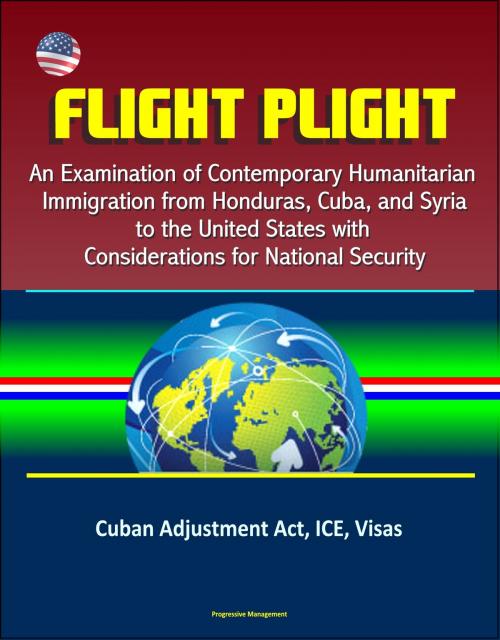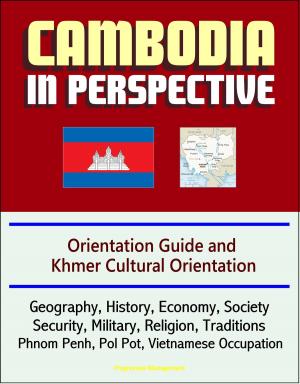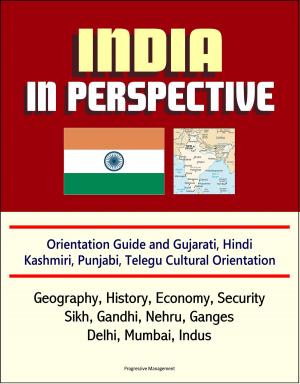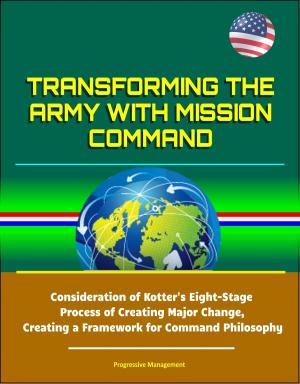Flight Plight: An Examination of Contemporary Humanitarian Immigration from Honduras, Cuba, and Syria to the United States with Considerations for National Security - Cuban Adjustment Act, ICE, Visas
Nonfiction, History, Americas, Latin America, Social & Cultural Studies, Social Science, Cultural Studies, Emigration & Immigration| Author: | Progressive Management | ISBN: | 9781370897254 |
| Publisher: | Progressive Management | Publication: | October 25, 2016 |
| Imprint: | Smashwords Edition | Language: | English |
| Author: | Progressive Management |
| ISBN: | 9781370897254 |
| Publisher: | Progressive Management |
| Publication: | October 25, 2016 |
| Imprint: | Smashwords Edition |
| Language: | English |
This excellent report has been professionally converted for accurate flowing-text e-book format reproduction. This study examines contemporary U.S. immigration for humanitarian populations from Honduras, Cuba, and Syria. Humanitarian immigration refers to refugees, asylum seekers, and those who are forcibly displaced from their homelands. The study explores how the United States can balance its identity as a nation of immigrants with its increasing security concerns within forced migrant populations. The research describes various philosophies of and motives for migration and the United States' role as an international destination for refugees. The study also provides a comprehensive review of all U.S. humanitarian immigration programs available to forced migrants from Honduras, Cuba, and Syria. These unique reviews, or case studies, are introduced with descriptions of each country's social, political, and historical context for migration and feature fictional scenarios in which immigrant families interact directly with country conditions and the U.S. humanitarian immigration programs available to them. Finally, the thesis reviews national security concerns presented by humanitarian immigration programs and explains how national priorities and legislative remedies can temper public fear.
CHAPTER I - INTRODUCTION * A. RESEARCH QUESTION * B. LITERATURE REVIEW * 1. Philosophy of Migration * 2. Refugees, Asylum seekers, and Displaced Persons * 3. The American Dream * C. METHODOLOGY FOR RESEARCH * D. DISCLAIMER * CHAPTER II - CASE STUDY: HONDURAS * A. COUNTRY CONTEXT * B. FICTIONAL SCENARIO * C. IMMIGRATION OPTIONS * 1. Temporary Protected Status * 2. Options for Children * 3. Special Immigrant Juveniles * 4. T and U Visas * 5. Deferred Action and Humanitarian Parole * 6. Asylum Programs * D. SECURITY CONCERNS * E. CONCLUSION * CHAPTER III - CASE STUDY: CUBA * A. COUNTRY CONTEXT * B. FICTIONAL SCENARIO * C. IMMIGRATION OPTIONS * 1. Diversity Lottery Visa Program, El Bombo * 2. Cuban Medical Professional Parole Program * 3. Cuban Adjustment Act * 4. Cuban Family Reunification Parole Program * D. SECURITY CONCERNS * E. CONCLUSION * CHAPTER IV - CASE STUDY: SYRIA * A. COUNTRY CONTEXT * B. FICTIONAL SCENARIO * C. REFUGEE STATISTICS * D. IMMIGRATION OPTIONS * 1. U.S. Refugee Program * 2. Temporary Protected Status * E. SECURITY CONCERNS * F. CONCLUSION * CHAPTER V - CONSIDERATIONS FOR NATIONAL SECURITY * A. LEGAL IMMIGRATION SYSTEM * B. UNLAWFUL ENTRIES, LAWFUL STATUS * C. UNLAWFUL ENTRIES, UNLAWFULLY PRESENT * D. IN HINDSIGHT * CHAPTER VI - RECOMMENDATIONS * A. IMMIGRATION AND NATIONAL IDENTITY * B. LEGISLATION * C. IDEAS FOR FUTURE RESEARCH * D. FINAL THOUGHTS
This excellent report has been professionally converted for accurate flowing-text e-book format reproduction. This study examines contemporary U.S. immigration for humanitarian populations from Honduras, Cuba, and Syria. Humanitarian immigration refers to refugees, asylum seekers, and those who are forcibly displaced from their homelands. The study explores how the United States can balance its identity as a nation of immigrants with its increasing security concerns within forced migrant populations. The research describes various philosophies of and motives for migration and the United States' role as an international destination for refugees. The study also provides a comprehensive review of all U.S. humanitarian immigration programs available to forced migrants from Honduras, Cuba, and Syria. These unique reviews, or case studies, are introduced with descriptions of each country's social, political, and historical context for migration and feature fictional scenarios in which immigrant families interact directly with country conditions and the U.S. humanitarian immigration programs available to them. Finally, the thesis reviews national security concerns presented by humanitarian immigration programs and explains how national priorities and legislative remedies can temper public fear.
CHAPTER I - INTRODUCTION * A. RESEARCH QUESTION * B. LITERATURE REVIEW * 1. Philosophy of Migration * 2. Refugees, Asylum seekers, and Displaced Persons * 3. The American Dream * C. METHODOLOGY FOR RESEARCH * D. DISCLAIMER * CHAPTER II - CASE STUDY: HONDURAS * A. COUNTRY CONTEXT * B. FICTIONAL SCENARIO * C. IMMIGRATION OPTIONS * 1. Temporary Protected Status * 2. Options for Children * 3. Special Immigrant Juveniles * 4. T and U Visas * 5. Deferred Action and Humanitarian Parole * 6. Asylum Programs * D. SECURITY CONCERNS * E. CONCLUSION * CHAPTER III - CASE STUDY: CUBA * A. COUNTRY CONTEXT * B. FICTIONAL SCENARIO * C. IMMIGRATION OPTIONS * 1. Diversity Lottery Visa Program, El Bombo * 2. Cuban Medical Professional Parole Program * 3. Cuban Adjustment Act * 4. Cuban Family Reunification Parole Program * D. SECURITY CONCERNS * E. CONCLUSION * CHAPTER IV - CASE STUDY: SYRIA * A. COUNTRY CONTEXT * B. FICTIONAL SCENARIO * C. REFUGEE STATISTICS * D. IMMIGRATION OPTIONS * 1. U.S. Refugee Program * 2. Temporary Protected Status * E. SECURITY CONCERNS * F. CONCLUSION * CHAPTER V - CONSIDERATIONS FOR NATIONAL SECURITY * A. LEGAL IMMIGRATION SYSTEM * B. UNLAWFUL ENTRIES, LAWFUL STATUS * C. UNLAWFUL ENTRIES, UNLAWFULLY PRESENT * D. IN HINDSIGHT * CHAPTER VI - RECOMMENDATIONS * A. IMMIGRATION AND NATIONAL IDENTITY * B. LEGISLATION * C. IDEAS FOR FUTURE RESEARCH * D. FINAL THOUGHTS















